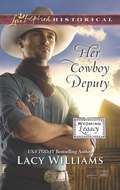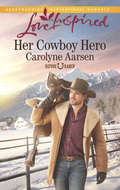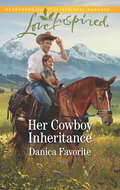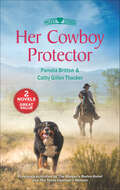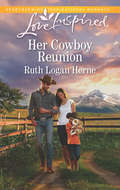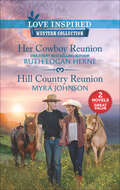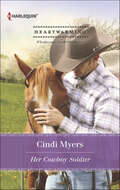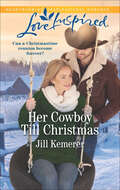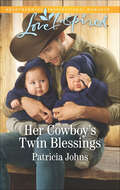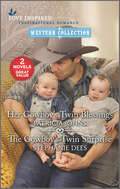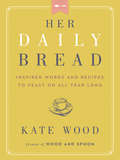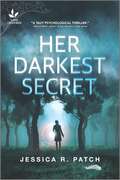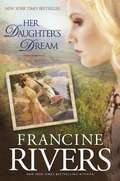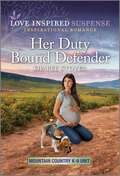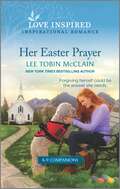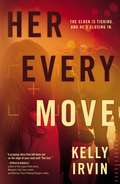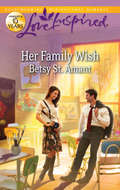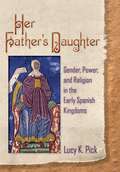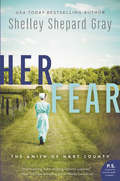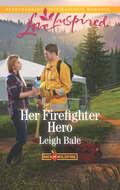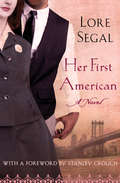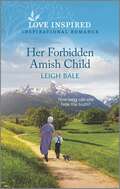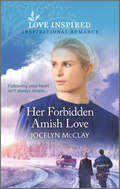- Table View
- List View
Her Cowboy Deputy
by Lacy WilliamsStranded! Bear Creek sheriff's deputy Matt White is used to being the rescuer, not the rescued. But now the hurt lawman's marooned on Catherine Poole's remote homestead. The little girl he'd known briefly as a child is all grown up-and tugging at his heart. Isolated from the world around her, Catherine's spent her whole life caring for her ailing grandfather. The last thing she needs is a cowboy stranded in her home. Let alone the memories he dredges up of a past she's tried to put behind her. But can this deputy be her chance to finally move forward and find true happiness?
Her Cowboy Hero
by Carolyne AarsenSecond-Chance Cowboy Montana rodeo star Tanner Fortier is a good man. A man Keira Bannister never stopped loving. But when he shows up at Refuge Ranch looking to have his late brother's saddle repaired in time for the championships, he's the last person Keira wants to see. For years, she's kept hidden the real reason for breaking their engagement-and Tanner's heart. But now, with him at the ranch, she's tempted to reveal the truth-one that could destroy him. But she knows that to have a future with the man of her dreams, she has to settle the past... Refuge Ranch: Where a Montana family comes home to love.Montana rodeo star Tanner Fortier is a good man. A man Keira Bannister never stopped loving. But when he shows up at Refuge Ranch looking to have his late brother's saddle repaired in time for the championships, he's the last person Keira wants to see. For years, she's kept hidden the real reason for breaking their engagement-and Tanner's heart. But now, with him at the ranch, she's tempted to reveal the truth- one that could destroy him. But she knows that to have a future with the man of her dreams, she has to settle the past... Refuge Ranch: Where a Montana family comes home to love.
Her Cowboy Inheritance: Her Amish Child Her Cowboy Inheritance The Marriage Bargain (Three Sisters Ranch #1)
by Danica FavoriteWhen a widowed mom inherits a Colorado ranch with her sisters, it brings a new start—and, just maybe, a new love . . .Inheriting a ranch with her two sisters is the fresh start young mother Leah Holloway desperately needs. The problem? Leah knows nothing about ranching. And the only person willing to teach her is Shane Jackson, the handsome and oh-so-infuriating cowboy next door.Trusting each other means they’ll risk everything—including a connection that might just blossom into something dangerously real . . .
Her Cowboy Protector
by Cathy Gillen Thacker Pamela BrittonFind your Happily Ever After with two feel-good stories of dogs unleashing romance in small-town settings.RESISTING HER RESCUERThe Ranger’s Rodeo Rebel by Pamela BrittonUnder the guise of taking over the family’s rodeo act, former army ranger Chance Reynolds is actually home to protect their star trick rider, Carolina Cruthers, from her ex. Keeping an eye on the fearless blonde isn’t tough. Keeping things professional? That’s tougher. As life on the rodeo trail draws them closer, what started as a short-term arrangement is becoming something more. Can Chance convince Caro that they should team up forever?The Texas Lawman’s Woman by Cathy Gillen ThackerThanks to her scheming ex-husband, Shelley Meyerson is about to lose her home. The last person she wants to turn to is deputy sheriff Colt McCabe, the guy who broke her heart in high school. True, the handsome lawman seems to genuinely care about Shelley and her little boy. But learning to trust again is hard. Especially when Colt’s been keeping a secret that could cost him his badge…
Her Cowboy Reunion (Shepherd's Crossing)
by Ruth Logan HerneA new life...an old love Can she risk loving him again in Shepherd’s Crossing?With her family in disgrace, Lizzie Fitzgerald never imagined she’d end up at an Idaho ranch. Fortunately, she’s working with horses she loves—even if it means dealing with her old sweetheart Heath Caufield. The widowed father of an adorable boy, Heath hasn’t forgiven Lizzie for their past. But even a stubborn cowboy can’t stop the heart’s ability to forgive...or love again.
Her Cowboy Reunion and Hill Country Reunion (Western Collection)
by Ruth Logan Herne Myra JohnsonHer Cowboy Reunion by Ruth Logan HerneWith her family in disgrace, Lizzie Fitzgerald never imagined she’d end up at an Idaho ranch. She loves working with the horses—even if it means dealing with her old sweetheart Heath Caufield. The widowed father of an adorable boy, Heath hasn’t forgiven Lizzie for their past. But even a stubborn cowboy can’t stop the heart’s ability to forgive…or love again.Hill Country Reunion by Myra JohnsonVeterinarian Tripp Willoughby thought keeping his chronic illness a secret was the right thing to do—but he ended up breaking his college girlfriend’s heart. Diana Matthews has a new life now, and she’s reluctant to accept Tripp’s help with her pet therapy program. As they work together, Tripp remembers how things used to be with Diana—and is convinced he must find a way to win her back.USA TODAY Bestselling Author Ruth Logan Herne
Her Cowboy Soldier
by Cindi MyersCan she open her heart?The Hartland Herald isn’t exactly the big leagues. But for army widow Amy Marshall it’s the first step to a career that will allow her to support her young daughter and start a new life in the city. Unfortunately, writing a story that will get her noticed requires stepping on a few toes. Josh Scofield’s toes, to be exact.Sure, her article was less than flattering. She probably shouldn’t have suggested the injured veteran got his teaching position unfairly, but a real reporter can’t pull punches. And she hadn’t pegged the former military man as someone who cared what other people thought.As she digs deeper, though, Amy realizes there’s more to Josh than just a good story. But it will be hard to win his trust, and is there any point when she doesn’t plan on sticking around?
Her Cowboy Till Christmas (Wyoming Sweethearts #1)
by Jill KemererCan a Christmastime reunion last forever? First in the Wyoming Sweethearts series from the author of The Cowboy’s Little Secret.She’s only home for the holidays . . . Can he convince her to stay?The last person rancher Mason Fanning ever expects to see again is the girl who once broke his heart. Brittany Green is in town for Christmas and trying to convince her ailing grandmother—the only maternal figure the widower’s little boy has left—to move away. Can Mason show her all she really needs to fulfill her dreams is right here in Wyoming?
Her Cowboy's Twin Blessings (Montana Twins #1)
by Patricia JohnsTwo stubborn hearts. One ranch.Could Montana Twins unite them?With orphaned twin infants to care for, Casey Courtright hoped to buy the ranch he works on—but he can’t match Ember Reed’s offer. Nevertheless, Casey agrees to show Ember the land she plans to use for her therapy center, but only if she’ll help him with the babies. And as the twins draw them together, Casey might just find that Ember is his perfect partner.
Her Cowboy's Twin Blessings and The Cowboy's Twin Surprise
by Patricia Johns Stephanie DeesCan twin babies unite them?Her Cowboy’s Twin Blessings by Patricia JohnsWith orphaned twin infants to care for, Casey Courtright hoped to buy the ranch he works on—but he can’t match Ember Reed’s offer. Nevertheless, Casey agrees to show Ember the land she plans to use for her therapy center, but only if she’ll help him with the babies. And as the twins draw them together, Casey might just find that Ember is his perfect partner.The Cowboy’s Twin Surprise by Stephanie DeesDespite his too-rowdy past, former rodeo star Devin Cole’s stunned when the woman he married after a whirlwind romance shows up pregnant with his twins…demanding a divorce. He convinces barrel rider Lacey Jenkins to give him six months to show her he’s changed. But proving he can be a champion husband and father is the hardest—and most important—challenge he’s ever faced.
Her Daddy's Eyes
by Gary E. ParkerShe had black eyes just like her daddy who she did not know since she was a little girl. Now after seeing a picture of him and also having other happenings that pointed her towards him, she was driven to find him. Were all the happenings pushing her to try to find him God's work or just coincidences? What would finding him tell her?
Her Daily Bread: Inspired Words and Recipes to Feast on All Year Long
by Kate Wood“Kate’s heart for food and people warm every page… truly, a comforting read for anyone with an appetite for loving others well.”– Bob Goff, New York Times bestselling author of Dream Big and Live in GraceFrom the writer and photographer behind the award-winning Wood and Spoon blog comes a 365-day devotional, featuring daily reflections and 52 delicious recipes that will nourish the body and soul throughout the year.In the midst of her busy schedule, Kate Wood, award-winning blogger behind Wood and Spoon and mother of three, realized that she was surviving, but not thriving, and that what she needed more than another cup of coffee was real connection with herself, with others, and with God. At the table, there’s an invitation to serve, connect, and give deeply of ourselves, and Kate invites us to join her at that table through the pages of this daily devotional. Like a conversation with a good friend, each day offers the chance to reflect, go deeper into scripture, and receive the encouragement you need. Kate also shares treasured family recipes, including:• Mom’s Homemade Bread• Two-Bite Crab Cakes with Lemon Dill Aioli• Cheddar Cornmeal Chicken Pot Pie• Simple Pesto Risotto• Weekday Red Velvet Cake• Birthday Sprinkle Pancakes• Fluffernutter Pretzel PieFind a comfy chair, grab a cup of coffee, and settle into these words that offer encouragement, connection, and hope.
Her Darkest Secret
by Jessica R. PatchWhen a cold-case serial killer returns, FBI special agent Fiona Kelly has one last chance to stop him before he claims the prize he&’s always wanted—her. The sight of a goose feather at a murder scene modeled after a children&’s poem is enough to make FBI special agent Fiona Kelly's blood turn to ice. Almost two decades ago, a feather was left with her sister's body—and with every subsequent victim of the Nursery Rhyme Killer. Now he's back. Only this time, his latest gruesome murder is a message to the only one who ever got away: Fiona. Finding &“Rhyme&” is an obsession that's fueled Fiona's career—and destroyed her marriage to fellow FBI agent Asa Kodiak. Now Fiona and Asa have to put their past tensions aside and work together one last time. But Rhyme is watching, and catching this killer may force Fiona to reveal her biggest, darkest secret…the one only he knows.&“Her Darkest Secret by Jessica R. Patch grabbed me in the first scene of this edge-of-your-seat suspense and didn't let go until the end!&”—Patricia Bradley, author of the Memphis Cold Case novels
Her Daughter’s Dream (Marta’s Legacy Series Book #2)
by Francine RiversBack Cover: “In the dramatic conclusion to the Marta's Legacy series, Marta's granddaughter, Carolyn, comes of age during the turbulent 1960s, struggling to navigate a tense family life. Though college offers a taste of freedom, tragedy shatters Carolyn's confidence and she disappears into the heady counterculture of San Francisco. When she reemerges two years later, more lost than ever, she reluctantly turns to her family to help rebuild a life for herself and her own daughter, May Flower Dawn. “Familiar tensions emerge when Dawn develops a closer bond with her grandmother than her own mother. As she struggles to avoid the mistakes of those who went before her, Dawn vows to become a bridge between the women in her family rather than the wall that separates them forever.” The author emphasizes Christian themes such as forgiveness, reconciliation, and repentance as the way to solve these problems.
Her Duty Bound Defender (Mountain Country K-9 Unit #2)
by Sharee StoverThreatened and falsely accused… She&’ll need this K-9&’s protection. Only seconds after widowed mother-to-be Naomi Carr-Cavanaugh is rescued from two masked gunmen, she&’s accused of multiple murders. Detective Bennett Ford believes he&’s finally apprehended the Rocky Mountain Killer—until Naomi is attacked again. Now she must rely on Bennett and his K-9 partner for protection. But with threats closing in, she&’ll have to prove her innocence first in order to stay alive…From Love Inspired Suspense: Courage. Danger. Faith.Mountain Country K-9 Unit Book 1: Baby Protection Mission by Laura ScottBook 2: Her Duty Bound Defender by Sharee StoverBook 3: Chasing Justice by Valerie HansenBook 4: Crime Scene Secrets by Maggie K. BlackBook 5: Montana Abduction Rescue by Jodie BaileyBook 6: Trail of Threats by Jessica R. Patch
Her Easter Prayer: An Uplifting Inspirational Romance (K-9 Companions #4)
by Lee Tobin McClainForgiving herself could be the answer she needs…in this novel by New York Times bestselling author Lee Tobin McClain. While recovering from the past… Can she hope for a new future? After a tragic loss, reading teacher Emily Carver dedicates her life to educating troubled boys with the help of service dog Lady. Tutoring new school handyman Dev McCarthy&’s struggling son reminds Emily of everything she&’s missing. Time spent with them could heal her heart—only, Dev has a secret. Can she see past what he&’s hiding to the family forming around her?From Love Inspired: Uplifting stories of faith, forgiveness and hope.K-9 Companions Book 1: Their Unbreakable Bond by Deb KastnerBook 2: Finding Her Way Back by Lisa CarterBook 3: The Veteran's Vow by Jill LynnBook 4: Her Easter Prayer by Lee Tobin McClainBook 5: Earning Her Trust by Brenda MintonBook 6: Guarding His Secret by Jill KemererBook 7: An Unlikely Alliance by Toni Shiloh
Her Every Move
by Kelly IrvinHe&’s a cop trying to stop a serial bomber. And she&’ll stop at nothing to clear her own name. When a deadly bomb goes off during a climate change debate, librarian and event coordinator Jackie Santoro becomes the prime suspect. Her motive, according to Detective Avery Wick: to avenge the suicide of her prominent father, who was accused of crimes by a city councilman attending the event. Though Avery has doubts about Jackie&’s guilt, he can&’t exonerate her even after an extremist group takes responsibility for the bombing and continues to attack San Antonio&’s treasured public spaces. As Jackie tries to hold her shattered family together, she has no choice but to proceed with plans for the Caterina Ball, the library system&’s biggest annual fundraiser. But she also fears the event provides the perfect opportunity for the bomber to strike again. Despite their mistrust, Jackie and Avery join forces to unmask the truth—before the death toll mounts even higher. Bestseller Kelly Irvin is back with a nail-biting romantic suspense where nothing is certain until the very last page. Praise for Her Every Move:&“A gripping story that will have you on the edge of your seat until &‘The End.&’&”—Patricia Bradley, author of The Logan Point Series, Memphis Cold Case Novels, Natchez Trace Parkway Rangers series &“Explosive, tender, and races all the way through!&”—Jennifer Graeser Dornbush, author, screenwriter, and forensic specialist Stand-alone romantic suspenseFull-length novel, approximately 90,000 wordsIncludes discussion questions for book clubs
Her Family Wish
by Betsy St. AmantTaking pictures of other people's happiest moments is the perfect job for Hannah Hart. Secretly fearing that she won't ever have a family of her own, Hannah prefers to hide behind the camera. Until she meets assistant principal Jude Bradley, whose twelve-year-old daughter instantly bonds with Hannah. Jude might just be the man to give Hannah a reason to smile-if he can let go of the past. The more Hannah and Jude discover they have in common, the more Hannah wonders if there's a family in her future after all....
Her Father’s Daughter: Gender, Power, and Religion in the Early Spanish Kingdoms
by Lucy K. PickIn Her Father's Daughter, Lucy K. Pick considers a group of royal women in the early medieval kingdoms of the Asturias and of León-Castilla; their lives say a great deal about structures of power and the roles of gender and religion within the early Iberian kingdoms. Pick examines these women, all daughters of kings, as members of networks of power that work variously in parallel, in concert, and in resistance to some forms of male power, and contends that only by mapping these networks do we gain a full understanding of the nature of monarchical power. Pick's focus on the roles, possibilities, and limitations faced by these royal women forces us to reevaluate medieval gender norms and their relationship to power and to rethink the power structures of the era. Well illustrated with images of significant objects, Her Father's Daughter is marked by Pick's wide-ranging interdisciplinary approach, which encompasses liturgy, art, manuscripts, architecture, documentary texts, historical narratives, saints' lives, theological treatises, and epigraphy.
Her Fear: The Amish of Hart County
by Shelley Shepard GrayIn New York Times bestselling author Shelley Shepard Gray’s latest novel of suspense in her Amish of Hart County series, an EMT falls for a woman with ties to an Amish community where people are dying similar, suspicious deaths.Sadie Detweiler never imagined she’d move to Kentucky, yet here she is: a pregnant, unmarried Amish girl banished by unforgiving parents to live with kin she barely knows. The men are gruff and her cousins are secretive. Worst of all, elderly matriarch Verba becomes mysteriously ill shortly after Sadie moves in. When EMT Noah Freeman arrives, Sadie immediately notices he’s unlike any other Amish man she’s met. Noah is warm, confident, and has an easy way with practically everyone in the community, both Amish and English. Though Sadie is drawn to him, she has little hope he will reciprocate her feelings once he learns she’s with child.Noah can’t understand how a girl as sweet and lovely as Sadie ended up sleeping on a cot in Verba Stauffer’s kitchen. He also senses Sadie is terrified of something. Concerned, he checks up on her. Eventually they strike up a friendship and soon their attraction is undeniable. When Verba later dies at the hospital and her death is followed by two others, Noah’s boss wants him to dig around the Amish community for clues. He agrees—for Sadie’s sake—because only the truth will keep her safe and by his side.
Her Firefighter Hero: The Cowboy's Twins Her Firefighter Hero Her Texas Family (Men of Wildfire #1)
by Leigh BaleA young fireman’s widow finds that her heart and home are warming to a new man on her husband’s former crew in this inspirational romance.Megan Rocklin is trying hard to pick up the pieces. A year after her fireman husband's death, she has managed to keep the family diner going and tend to her two active children, June and Caleb. She's sure that's all she can handle—and then Jared Marshall asks Megan to cater the meals for his hotshot crew.With his rugged good looks, the new fire management officer for Minoa, Nevada, turns many heads—but his heart leads him straight to Megan. She's promised herself she'll never date another firefighter. But determined Jared refuses to give up on the family meant to be his . . .
Her First American: A Novel
by Lore SegalHailed by the New York Times as coming &“closer than anyone to writing The Great American Novel,&” Lore Segal stuns with this passionate love story of a refugee from Hitler&’s Europe and a witty, hard-drinking black intellectual For Ilka Weissnix, everything is new. Having recently arrived in the United States, she is determined to escape the immigrant communities of New York and boards a train headed west to discover &“the real America.&” She finds Carter Bayoux &“sitting on a stool in a bar in the desert, across from the railroad.&”Older, portly, experienced, and black, Carter is magnetic. To Ilka, he exemplifies the values and cultures of a changing America. In order to understand her new country and her new love, Ilka throws herself into Carter&’s dizzying world, nurses him through his bouts of depression and his alcoholism, and becomes fascinated by stories of his amorous past. But Carter&’s ghosts are ever present, and soon Ilka finds herself torn between saving him and saving her own future.With a foreword by Stanley Crouch, Her First American is the poignant story of an immigrant experience in a country of endless possibilities and of a rich and breathtaking love that is doomed from the start.
Her Forbidden Amish Child: An Uplifting Inspirational Romance (Secret Amish Babies #2)
by Leigh BaleNo one can ever know the truth… Especially her son. Four years ago, having a child out of wedlock changed everything for Tessa Miller—including her engagement to Amish farmer Caleb Yoder. Now she&’s determined to provide a better life for her son…even if it means working for her ex-fiancé. Only spending time with Caleb makes it harder to keep her past a secret. Will revealing the truth lead to forgiveness…and a second chance together?From Love Inspired: Uplifting stories of faith, forgiveness and hope.Secret Amish Babies Book 1: The Midwife's Christmas WishBook 2: Her Forbidden Amish Child
Her Forbidden Amish Love
by Jocelyn McClayFollowing your heart isn’t always simple…Choosing between her community…and the man she still loves.Five years ago, Hannah Lapp walked away from Gabe Bartel, crushing their dreams of a future together. She couldn’t break her parents’ hearts by marrying a Mennonite man and leaving the Amish community. Now Gabe is back as her town’s new EMT. And Hannah’s heart is on the line all over again, because this time she can’t imagine letting him go…From Harlequin Love Inspired: Uplifting stories of faith, forgiveness and hope.
Her Forbidden Christmas Match: An Uplifting Inspirational Romance (Seven Amish Sisters #5)
by Emma MillerAn Amish woman. A man who&’s lost his way. Can they find love this Christmas? After leaving a harsh religious community, widower Aaron Raber won&’t let anything separate him from his five-year-old daughter—not even his new job on a construction site. But that&’s before he meets the disapproval of Willa Koffman. The stubborn Amish woman is convinced she has the perfect solution: she&’ll babysit the little girl while the cranky Mennonite works. But neither expects their growing attraction. Now Willa must make a choice before Christmas—between the community she loves…and the man she doesn't want to live without.From Love Inspired: Uplifting stories of faith, forgiveness and hope.Seven Amish Sisters Book 1: Her Surprise Christmas CourtshipBook 2: Falling for the Amish Bad BoyBook 3: The Teacher's Christmas SecretBook 4: An Unconventional Amish PairBook 5: Her Forbidden Christmas MatchBook 6: The Widower Takes a Wife
